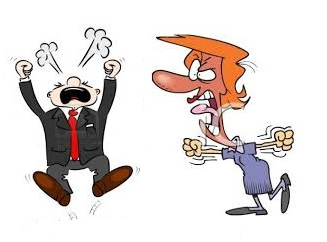Linda Martin, what were you thinking? Storming off the stage to confront Billy McGuinness, after verbally attacking him as an ‘odious little man’ in front of a TV audience of thousands. (Replay on the Irish Examiner webpage.) 
It seems TV loves it when chaos erupts during a live performance – reality TV at its ‘finest’ but what are our children learning about human interaction?
Are we adults giving a message that if somebody says something you don’t like or agree with:
– it’s okay to insult them
– it’s okay to make them feel small in front of others
– it’s okay to bring other unrelated comments into the argument?
(‘You may not be used to dealing with women with brains’ – Linda, what is that saying about your opinion of the many woman who interact with Billy McGuiness, including Laura O’Neill!)
What was Linda hoping to achieve? She’s a fine lady and we’re proud of her contribution to our country. I just wish she’d used this opportunity to model graciousness. What I want my children to know is how to have a good clean fight that improves understanding and restores relationship.
So for Linda Martin and for any parent who wants to raise their child’s level of Emotional Intelligence, here are ten top tips on how to use Anger constructively.
* You don’t have to attend every argument you’re invited to.
* When you get angry the reactive part of your brain takes control, so your clear thinking temporarily shuts down. So rather than blurting out the first thing that jumps onto your tongue, focus on your breathing. Breathe in 1-2-3-4-5-6-7- out 8-9-10-11 several times. You’ll get more oxygen into the brain, you’ll become calmer, your thinking brain will reengage
* Ask yourself, ‘What really matters here?’ (If you were to look back on this incident in ten years’ time, what would you like to remember?)
* The person’s behaviour is about them; your response is about you.
* Two wrongs never make a right.
* It’s never ok to insult another. Treat others as you would like to be treated, even (or especially) when you’re angry.
* When there’s an issue that needs to be discussed, stick to that topic only and don’t allow any other issue to contaminate the space.
* Anger is always a signal, ‘I need change.’ (So figure out how to create the change you need. And sometimes the only change you can make is the way you think about something).
* Anger and aggression are not the same thing. I feel angry but when I act out of that anger it becomes aggression. Aggression is never pretty, helpful or healing in any relationship.
* My feelings are never wrong, providing I never use them as weapons against anyone, including myself.
What tip would YOU add to this list about Managing Anger?
Nearly fifteen years ago I started a programme that introduced preschoolers to basic Emotional Intelligence, including what to do when you’re feeling angry. I was so amazed at the children’s enthusiastic and wise response to this work that it began my path of working with parents so that families can:
think more clearly,
connect more compassionately,
behave more response-ably
and live more joyfully.
If you’d like to discover more, I’m running a six week evening Parenting Course in Douglas, Cork: How to Listen so your child Will Talk
and also Kinsale: ‘BEHAVE – what to do when your child won’t’ (based on Val Mullally’s forthcoming book)


No comments yet.